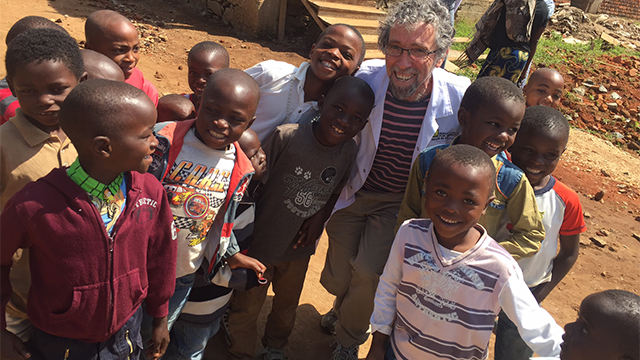
It looks as simple as a thermometer but a new device developed by University of Alberta researchers in the Department of Pediatrics has won $100,000 from Grand Challenges Canada for its potential to save the lives of children.
Worldwide, pediatric respiratory infections claim the lives of hundreds of thousands of children. Pneumonia alone is responsible for the deaths of 900,000 children under-five annually in the developing world where, without x-ray machines or laboratory testing, the only way to diagnose pneumonia is to count breaths-an imprecise method. A systematic review found that diagnosis using respiratory rate is poor and that any clinical "decision tree" based on one clinical sign alone is unlikely to improve diagnosis or outcomes.
That's the idea behind the Multimometer, a simple tool developed by Israel Amirav, an associate professor and Michael Hawkes, an assistant professor-both in the Department of Pediatrics at the U of A's Faculty of Medicine & Dentistry.
Building on the success of a forerunner, the Respimometer-a thermometer-shaped device that measured both respiratory rate and temperature-the researchers added two more diagnostic features.
"Our idea is to develop a simple-to-use, point-of-care device that is used like an oral thermometer but simultaneously measures a child's key vital signs: respiratory rate, temperature, oxygen saturation and heart rate. This diagnostic tool will transform the ability of the Community Health Worker (CHW) to accurately and efficiently identify pneumonia and other life-threatening conditions. For pneumonia, it will enable early treatment with antibiotics or oxygen as necessary to significantly reduce mortality," said Amirav.
The idea recently won a $100,000 grant from Grand Challenges Canada, a competition that awards monies to bold ideas that help improve health and development problems. The Multimometer was one of only 20 ideas from across Canada that won funding.
The competition is funded through Global Affairs Canada and other partners and is in its eighth round of funding, having started in 2011. Amirav, who leads the project, will use the grant money to improve the design of the Multimometer mouth interface and to integrate a reflexive pulse oximeter sensor into the device.
Amirav is hopeful that the device will be an impactful tool in global health.
"It is a huge step in advancing care and treatment in the developing world. With respiratory infections the number one killer of children under five years of age, we hope that the Multimometer will become a standard in care in the developing world, especially because it is a simple and cheap device that a community health worker can apply."
As the research moves forward, Amirav believes that the Multimometer may also have other telehealth applications. "Children or even adults staying in remote areas without access to health care could potentially use it, relay the information to a nursing station that can then decide if their care needs to be escalated, ensuring their health-care needs are met."